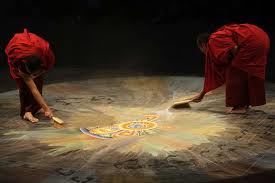 We had the final meeting of our Yoga for a World Out of Balance Meditation Book Group at Yoga Bliss yesterday. Last week we studied chapters 8 & 9 Brahmacarya: The Wise Use of Sexual Energy & Aparigraha: Non-acquisitiveness.
We had the final meeting of our Yoga for a World Out of Balance Meditation Book Group at Yoga Bliss yesterday. Last week we studied chapters 8 & 9 Brahmacarya: The Wise Use of Sexual Energy & Aparigraha: Non-acquisitiveness.
Our discussion was wide ranging. We considered the many ways yoga is an embodied practice intended to embrace our whole being: body, heart and mind. It’s a process of refining our sensitivity to what we feel and how we perceive. As sensitivity increases so does our awareness of pain and the many ways we try to separate ourselves from feeling. Yoga practice calls us back to sensation: whether it is the physical pain of movement or misalignment in posture or the anxiety expressed in racing pulse or repetitive thought. Yoga asks us to relate to our individual and shared pain. Our attempts to separate ourselves from feeling usually only add to our suffering.
The author, Michael Stone, says that Brahmacarya refers to the way we can use sexual energy as a way of entering the raw ground of human being by experiencing sexual energy as movement itself. He asks whether we can allow this energy to unfold without repression or entanglement. Is there is a way one can move with this energy without consuming or being consumed by it. I wonder if we can approach our perception of pain in the same way. Can we refrain from struggling with an intractable sense of “my pain” that seems to draw us into a narrow, separated experience of being? What if we explored the pain that is arising in a given moment with curiosity by following sensations as they change? Can we attend to experience below the level of language or even thinking? How can we grow more expansive in what we are willing to hold in awareness?
Can sexual energy or even the energy of pain give us access to something greater than our own perspectives? Don’t we come into being in relationship to a “M-other” and don’t we continue to develop and grow in relationship with others? Michael, observes that when we enter into relationship, any intimate sharing, renunciation is required. He describes this as a deep letting go that happens when we decide to meet life as it is. This interpretation of yoga seems to embrace both our inner experience of integration and our outer experience of unity with the world.
The book challenges us to consider the ways we accumulate objects, experiences even knowledge. Michael observes that the difference between wisdom and knowledge is flexibility. The constant movement toward mental accumulation makes it more difficult to rest in the kind of psychological stillness where the mind and body can truly receive and respond to life situations versus react to them. At the threshold of choice we can pause and create the conditions in which we can lead ourselves away from alienation. We can deliver ourselves from separation.
I shared a passage from Matthew Remski‘s, Threads of Yoga, a beautiful remix of Patanjali’s Yoga Sutras:
If only Patanjali encapsulated his discussion of ethics with single reference to empathy or love! The text would resonate with our present concerns much more. . . . The majority of our social sciences are fueled by the impulse of empathy: we wish to discover the other, or how we behave in groups, or how our behavioral patterns arise and how they can be altered for the better. The vast majority of our art and literature worships at the altar of love: how our primal attractions seek dynamic bonding, how we surge towards the other into the terrified joy of intimacy and loss.
Both these writers bring a refreshing interpretation to traditional wisdom teachings intended for ascetics often withdrawn from every day life. Michael Stone describes the Yamas as a set of commitments that are expressions of our deepest caring. He sees us as both a “self-project” and a “caring about others project”. The Yamas help us determine what we should be committed to in order to consistently return to our place in the web of life. Matthew Remski further suggests:
Perhaps we can start by reversing the purpose of his [Patanjali’s] ethical discussion, so that our intention behind treating others kindly is not about internal equanimity, but about the exploration of empathy as a path to self-and-other growth.
I deeply appreciate the opportunity to explore these teachings with my yoga friends. I hope we can continue the journey together.
Yoga for a World Out of Balance Homework 5
